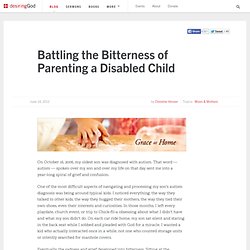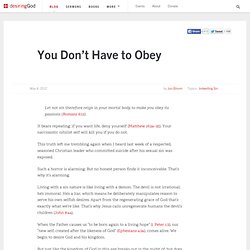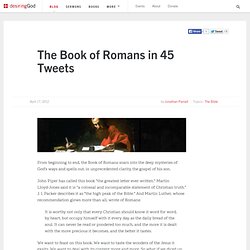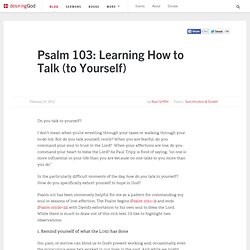

Battling the Bitterness of Parenting a Disabled Child. On October 16, 2006, my oldest son was diagnosed with autism.

That word — autism — spoken over my son and over my life on that day sent me into a year-long spiral of grief and confusion. One of the most difficult aspects of navigating and processing my son's autism diagnosis was being around typical kids. I noticed everything: the way they talked to other kids, the way they hugged their mothers, the way they tied their own shoes, even their interests and curiosities. In those months, I left every playdate, church event, or trip to Chick-fil-a obsessing about what I didn't have and what my son didn't do. On each car ride home, my son sat silent and staring in the back seat while I sobbed and pleaded with God for a miracle. Eventually, the sadness and grief developed into bitterness. Worse, I shot my bitter arrows at friends and family, who did nothing but show me love and support.
And so the bitter root grew wildly out of control, resulting in my own isolation and compounded grief. St. You Don’t Have to Obey. Let not sin therefore reign in your mortal body, to make you obey its passions (Romans 6:12).

It bears repeating: if you want life, deny yourself (Matthew 16:24–25). Your narcissistic nihilist self will kill you if you do not. This truth left me trembling again when I heard last week of a respected, seasoned Christian leader who committed suicide after his sexual sin was exposed. Such a horror is alarming. But no honest person finds it inconceivable. Living with a sin nature is like living with a demon. When the Father causes us “to be born again to a living hope” (1 Peter 1:3), our “new self, created after the likeness of God” (Ephesians 4:24), comes alive. But just like the kingdom of God in this age breaks out in the midst of, but does not yet destroy, Satan’s kingdom, so our new self comes alive while our “old self… corrupt through deceitful desires” (Ephesians 4:22) still remains. That’s what makes fighting sin difficult.
Here’s how you know. Get ready. The Book of Romans in 45 Tweets. From beginning to end, the Book of Romans soars into the deep mysteries of God's ways and spells out, in unprecedented clarity, the gospel of his son.

John Piper has called this book "the greatest letter ever written. " Martin Lloyd-Jones said it is "a colossal and incomparable statement of Christian truth. " J. I. Packer describes it as "the high peak of the Bible. " It is worthy not only that every Christian should know it word for word, by heart, but occupy himself with it every day, as the daily bread of the soul. We want to feast on this book. Well, here's our shot: the Book of Romans in 45 tweets. . . Romans 1 The resurrected Lord Jesus has commissioned the advance of his gospel for the sake of his name among all nations (#Romans 1:1-7). Serving God in the gospel of his Son and obligated to all peoples, preaching the gospel is marked by eagerness (#Romans 1:8-15). The gospel is God's power that results in salvation for everyone who believes. Psalm 103: Learning How to Talk (to Yourself) Do you talk to yourself?

I don’t mean when you’re wrestling through your taxes or walking through your to-do list. But do you talk yourself, really? When you are fearful, do you command your soul to trust in the Lord? When your affections are low, do you command your heart to bless the Lord? As Paul Tripp is fond of saying, “no one is more influential in your life than you are because no one talks to you more than you do.” In the particularly difficult moments of the day, how do you talk to yourself? Psalm 103 has been immensely helpful for me as a pattern for commanding my soul in seasons of low affection. 1. Sin, pain, or sorrow can blind us to God’s present working and, occasionally, even the miraculous ways he's worked in our lives in the past.
The Lord works righteousness and justice for all who are oppressed. David takes us (and himself) back to the most pivotal event he can think of. Instead, David brings us back to Sinai (see Exodus 6:6–9). 2. David is quoting Exodus 34:6.